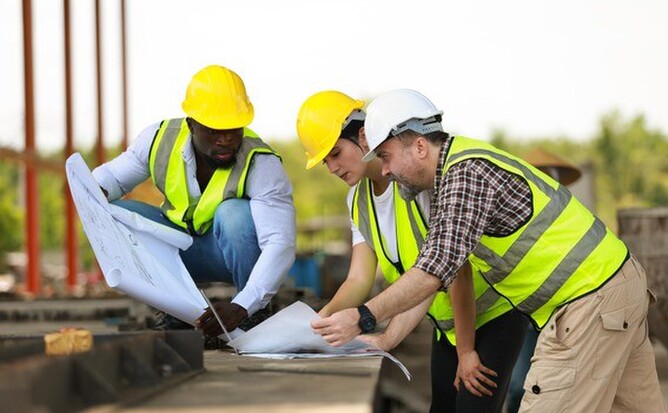Lean construction practices have become essential in modern construction projects due to their focus on maximizing customer value while minimizing waste. The lean methodology has roots in manufacturing but has adapted successfully to construction by emphasizing efficiency and streamlining processes. PE Builders believes in the power of lean construction to transform project outcomes, whether for healthcare facilities or mixed-use developments. Through our experience offering residential and commercial construction services in NYC, we have witnessed firsthand the benefits of lean construction. Here are common benefits for you to know.
Minimized Waste
One of the core principles of lean construction is the reduction of waste. In this context, waste is not limited to excess materials. It refers to anything that does not add value to the final product, such as time delays, unnecessary transportation, or rework. Lean construction helps reduce these inefficiencies by focusing on planning and coordination.
For example, through lean techniques like just-in-time delivery, construction teams make sure that materials arrive exactly when needed, preventing excess storage costs and material degradation. In our experience as general contractors for healthcare buildings in NYC, minimizing waste is especially critical in projects with tight schedules and high material costs like medical facilities.
Improved Workflow and Productivity
Lean construction optimizes the flow of work by coordinating tasks and guaranteeing that resources are available when needed. This continuous workflow reduces bottlenecks, making sure that teams can work at their maximum efficiency. The Last Planner System, a common lean tool, helps everyone—from subcontractors to project managers—work from the same plan and share a clear understanding of project goals. The shared responsibility promotes collaboration and reduces the likelihood of miscommunication, leading to a smoother construction process.
By incorporating lean construction practices, we have seen significant improvements in our projects. Our pre-construction services play a key role in this, allowing us to map out each step of a project to maintain steady progress from start to finish.
Higher Quality Control
Another major benefit of lean construction is its emphasis on quality control. In a lean environment, each team member is responsible for quality at every stage of the project. Identifying issues early on can prevent costly rework and make sure that each task is completed to the highest standards. This is particularly beneficial in healthcare construction, where the quality of materials and craftsmanship is critical to guarantee the safety and functionality of medical spaces.
For instance, when we manage projects for healthcare facilities, lean practices help make sure that every phase of the project meets strict regulatory requirements. This delivers spaces that are not only functional but also safe and compliant.
Cost Savings
Reducing waste, improving efficiency, and maintaining high-quality standards naturally result in cost savings. Lean construction helps to keep projects on budget by avoiding overproduction, excess inventory, and time delays. Additionally, by reducing rework and guaranteeing that materials are used efficiently, construction teams can keep costs under control.
For instance, in NYC, where construction costs are notoriously high, lean methods allow contractors to manage resources more effectively, leading to substantial savings in both labor and materials. Projects are completed more efficiently, and the risk of cost overruns is minimized.
Faster Project Completion
Lean construction is designed to increase speed without sacrificing quality. By eliminating inefficiencies and focusing on a clear workflow, lean projects are often completed faster than traditional ones. Tools like pull planning and look-ahead schedules assists in confirming that each phase of the project is completed on time, allowing subsequent tasks to start without delay.
This is particularly advantageous in industries like healthcare, where rapid project completion is often necessary. Faster delivery means less downtime for facilities under renovation or construction, allowing them to resume operations sooner. Our expertise in bringing residential and commercial construction services in NYC has shown us the value of lean practices in meeting tight deadlines without compromising quality.
Enhanced Collaboration and Communication
Collaboration is a key component of lean construction. Lean methods encourage everyone involved in a project to share information openly and collaborate toward a common goal. The transparency reduces the likelihood of errors and makes sure that all team members—from architects to builders—are aligned on the project objectives.
The use of the Last Planner System fosters collaboration by encouraging subcontractors to create their own work schedules and commit to meeting deadlines. By giving each team ownership of their tasks, lean construction reduces micromanagement and enhances communication across the board.
Increased Customer Satisfaction
The ultimate goal of lean construction is to deliver maximum value to the customer. By streamlining processes, reducing waste, and guaranteeing high-quality outcomes, lean construction consistently results in projects that meet or exceed customer expectations. Lean methods focus not only on delivering what the client asked for but also on adding value by anticipating needs and eliminating inefficiencies.
The focus on customer satisfaction is at the heart of every project we undertake. Whether we are working on a healthcare facility or a commercial development, lean practices help us deliver spaces that are not only functional but also completed on time and within budget.
Better Safety and Risk Management
In addition to improving efficiency and quality, lean construction also enhances safety on the job site. By streamlining workflows and reducing unnecessary movement of materials and personnel, lean practices create a safer work environment. With fewer disruptions and a more organized approach to construction, workers can focus on their tasks without the distractions that often lead to accidents.
Additionally, lean construction emphasizes risk management. Focusing on preventing problems before they arise with lean methods helps reduce the risk of costly errors or safety incidents. Pre-construction planning, for example, identifies potential hazards early in the project, allowing teams to take preventive measures.
Environmental Sustainability
Lean construction also contributes to sustainability by minimizing waste and maximizing resource efficiency. Reducing material waste, energy use, and emissions aligns lean practices with environmental goals. Therefore, construction teams can significantly reduce their environmental footprint, from minimizing material waste on-site to reducing transportation emissions by using just-in-time delivery systems.
In NYC, where sustainable construction is becoming increasingly important, lean practices are an effective way to meet environmental standards while still delivering high-quality results. Projects that incorporate sustainable methods often benefit from reduced operating costs, increased marketability, and compliance with local environmental regulations.
Continuous Improvement
Perhaps the most important benefit of lean construction is its focus on continuous improvement. Lean is not a one-time solution but a methodology that encourages teams to constantly seek ways to improve processes. Through techniques like the Plan-Do-Check-Adjust (PDCA) cycle, teams can continuously evaluate their work, identify inefficiencies, and make adjustments that lead to better results in future projects.
The commitment to continuous improvement is what makes lean construction such a powerful tool for the industry. Thus, construction teams can increase their efficiency, reduce costs, and consistently deliver projects that meet the highest standards.
Enhanced Safety
Lean construction principles often lead to improved safety on-site. Workers then can operate in a safer environment by eliminating unnecessary movements, reducing clutter, and organizing workflows more efficiently. Simplifying processes and removing non-value activities help prevent accidents that stem from disorderly or unsafe working conditions.
This results in fewer injuries, reduced downtime due to accidents, and lower insurance costs. Streamlining operations makes sure that the focus remains on completing the project safely and efficiently, protecting workers and clients alike.
Greater Flexibility and Adaptability
Lean construction practices provide greater flexibility and adaptability throughout a project’s lifecycle. The focus on continuous improvement and collaboration enables teams to respond quickly to changes, whether those involve shifting client requirements or unexpected site conditions.
Teams can pivot more smoothly without causing significant delays or wasting resources. Adaptability is crucial in complex projects like those in healthcare or large-scale commercial developments, where unforeseen challenges are common. Incorporating lean principles better equips project teams to adjust to changing circumstances without sacrificing quality or increasing costs.
Enhanced Stakeholder Engagement
Lean construction fosters closer relationships and more consistent communication between all stakeholders, including clients, contractors, subcontractors, and suppliers. Lean practices encourage early and ongoing collaboration to guarantee that the project stays aligned with the client's vision and expectations.
Regular feedback loops and collaboration at every stage of the project create a more transparent and inclusive environment. This improves trust and reduces the likelihood of misunderstandings or conflicts, ultimately leading to a smoother project process and a more satisfying outcome for everyone involved.
Lean construction brings a range of benefits, from waste reduction and cost savings to improved collaboration and customer satisfaction. At PE Builders, we apply lean construction principles to every project, guaranteeing efficiency and quality from the initial stages to full-scale builds. Lean construction emphasizes reducing waste, optimizing resources, and improving workflows, which helps us deliver projects on time and within budget.
Our focus on continuous improvement allows us to adapt quickly to challenges so that each phase of construction progresses smoothly. By prioritizing these principles, we not only meet the needs of our clients but also contribute positively to the communities where we build.
Whether you are planning a healthcare facility or a commercial development, lean construction offers the tools and techniques needed to make sure your project is completed on time, on budget, and to the highest standards.

